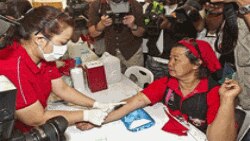THAILAND PROTEST: Anti-government protesters in Thailand have begun donating their own
blood to spill in front of various government buildings to emphasize
their demand for new elections.
Red-shirted personnel lined up Tuesday in Bangkok so medical personnel
could draw small amounts of blood, which will be spilled at Government
House, the prime minister's residence and the headquarters of the prime
minister's Democrat Party later in the day.
Protest leaders say the tactic symbolizes the sacrifices they are
prepared to make, but critics have denounced it as unsanitary and
wasteful.
OBAMA - ASIA: U.S. President Barack Obama leaves Washington this Sunday on his first
overseas journey of the year, a delayed visit to Indonesia and
Australia during which he hopes to strengthen U.S. ties in the
Asia-Pacific region.
Mr. Obama spent four boyhood years living in Indonesia after his mother
married an Indonesian man, and he has maintained close personal ties
with the world's most populous predominantly Muslim nation.
The president will arrive in Jakarta on March 23 and meet with
Indonesian President Susilo Bambang Yudhoyono.
UN - BURMA - NOKOR: The United Nations Human Rights Council has heard reports on widespread abuses in Burma and North Korea. At a meeting Monday in Geneva, Switzerland, the Council heard testimony by U.N. experts on both countries. The special envoy to Burma (, Tomas Ojea Quintana,) denounced the new election laws that bar prisoners of conscience from participating in this year's elections. The ban includes pro-democracy leader Aung San Suu Kyi. The Nobel Peace laureate has spent 14 of the last 20 years in some form of detention, and is serving an additional 18 months in house arrest for violating the current terms of her detention last year.
<!-- IMAGE -->US - ISRAEL - PALESTINIANS: Dozens of Palestinians threw rocks at Israeli police and set tires ablaze in East Jerusalem Tuesday to protest Israel's consecration of a synagogue in the area. Israeli police fired rubber bullets and stun grenades at the demonstrators and arrested several of them. Arab media say at least 20 Palestinians were injured. Israeli police say two officers also were hurt. Palestinians are also angered by Israel's decision last week to build new homes for Jews in East Jerusalem, an area they claim as a future capital. Palestinian officials want the project scrapped before they join U.S.-mediated indirect peace talks with Israel.
<!-- IMAGE -->SRI LANKA - TRIAL: Sri Lanka has begun court-martial proceedings against Sarath Fonseka,
the former army chief who lost a presidential bid in January.
News agencies say Fonseka appeared Tuesday before a three-member panel
at Sri Lanka's naval headquarters in (the capital city of) Colombo to
face allegations of sedition.
The former four-star general is charged with engaging in politics while
still in the army and violating regulations for purchasing military
supplies.
Fonseka has denied the charges, saying the case was brought to prevent him from running for parliament next month.
MEXICO - VIOLENCE: The U.S. Federal Bureau of Investigation has joined a Mexican probe
into attacks on U.S. consular staff and their families that have left
three people dead in the Ciudad Juarez border area.
Authorities in Mexico blamed the killings on the "Aztecas," a group linked to the powerful Juarez drug cartel.
A U.S. consulate employee and her husband, both Americans, were killed
Saturday as their car neared the U.S. border crossing. The couple's
baby, who was also in the car, was not injured.
In a separate shooting at about the same time, gunmen killed the
husband of a Mexican citizen employed by the consulate.
CUBA - INTERNET: Cuba is accusing the U.S. of using "tools of subversion" by allowing the export of Internet items to the country.
Washington announced last week it would ease sanctions against Cuba,
Iran, and Sudan to support the universal right of free speech.
Prior to the announcement, Microsoft, Google and other well-known U.S.
companies were unable to offer their products to those three countries.
U.S. officials say the ruling means Cubans, Iranians, and Sudanese will
be able to download software for Web browsing, blogging, e-mail,
instant messaging and other interactive social networking.
Listen to our World News for details.





